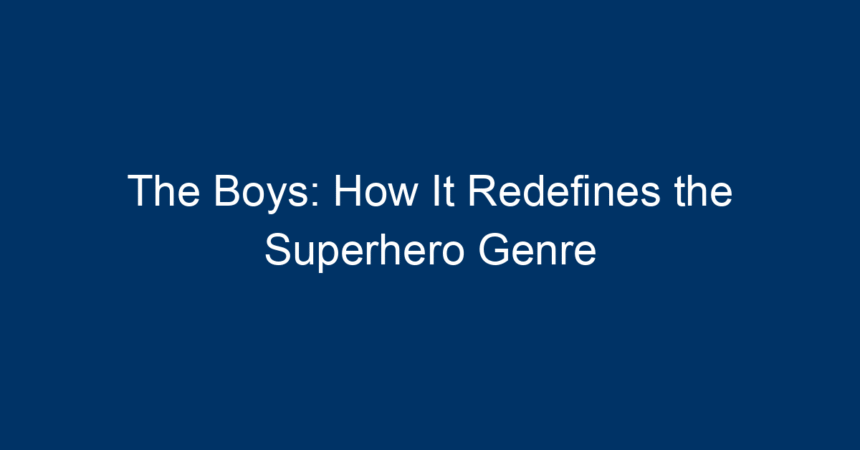In recent years, the superhero genre has exploded in popularity, fueled by blockbuster films and television series. However, few have managed to twist traditional superhero narratives into something as refreshingly controversial and thought-provoking as The Boys. Originating from the comic by Garth Ennis and Darick Robertson, this series has become a critical darling, gaining a massive following due to its unflinching approach to the genre. In this article, we will explore how The Boys redefines superhero storytelling, offering a gritty and cynical look at what it means to be a hero or a villain in a world saturated with power and fame.
A New Perspective on Heroism
The Flaws of Superheroes
Unlike the typical portrayal of superheroes as perfect paragons of virtue, The Boys dives deep into the psychological complexities and moral failings of these characters. The series showcases the darker side of power, illustrating how absolute power can corrupt absolutely. For instance, Homelander, the series’ main antagonist, is a chilling representation of what happens when someone believes they’re above accountability. His manipulative, narcissistic tendencies expose the flaws in the superhero archetype, forcing audiences to reconsider the implications of glorifying these figures.
Deconstructing the "Hero"
In many superhero narratives, moral dilemmas are often brushed aside to keep heroes in a favorable light. However, The Boys openly challenges this notion. The characters, including Butcher and Hughie, embody a spectrum of moral ambiguity. They grapple with ethical questions that resonate with the human experience, leading viewers to empathize with them despite their flaws. This deconstruction invites the audience to reflect on real-world heroes—politicians, celebrities, and influencers—who often fall from grace.
The Role of Corporations and Media
Superheroes as Brands
One of the standout themes in The Boys is the commercialization of superheroism. In this universe, superheroes are not mere saviors; they’re brands, products, and profit-generating machines. The Seven, the elite superhero team, is managed by Vought International, a company that treats heroics like a corporate venture. This depiction reflects our own society’s obsession with celebrity culture and the marketing of heroism, prompting viewers to scrutinize the motives behind our real-life heroes.
Media Manipulation and Public Perception
The Boys also explores the intersection of media and public perception. Vought controls the narrative surrounding its superheroes, using propaganda to maintain their image. This concept serves as a critical commentary on how media can distort the truth, shaping public opinion to favor the powerful while silencing dissent. In a world inundated with misinformation, The Boys invites discussions about the ethics of media representation and the responsibility of content creators to present nuanced portrayals.
Themes of Power and Corruption
The Dark Side of Power
At the heart of The Boys is a profound examination of power dynamics. The series reveals how those with power often exploit the vulnerable, drawing parallels to real-world institutions where the powerful manipulate and abuse those without authority. The tension between The Boys and The Seven exemplifies this struggle, as the former group attempts to expose the corruption of the latter.
Anti-Hero vs. Villain
The lines blur between hero and villain in The Boys, a departure from the classic dichotomy seen in superhero tales. Characters like Butcher and Homelander are both products of their environment, shaped by their experiences and choices. This ambiguity makes the narrative more engaging, enriching the viewing experience and allowing for complex character arcs that defy conventional genre expectations.
The Importance of Relationships
The Bonds that Break and Heal
Relationships play a pivotal role in The Boys, revealing the emotional toll that power struggles take on individuals. The camaraderie among The Boys highlights the importance of loyalty, trust, and sacrifice, while also illustrating the fragility of these bonds. For example, Hughie’s evolution from a naive, heartbroken individual into a more hardened and morally ambiguous character underscores the impact that relationships have on personal growth.
Tragic Consequences
The series does not shy away from depicting the tragic consequences of broken relationships. The fallout from betrayals and the emotional scars carried by characters like Starlight and Mother’s Milk resonate deeply with audiences. This exploration of the human experience adds depth to the story, making it not just about superpowers, but about the vulnerabilities and struggles that unite us all.
Humor in Dark Times
Satire and Dark Comedy
While The Boys tackles heavy themes, it also employs humor and satire to provide relief and critique societal norms. The absurdity of certain situations often elicits laughter, serving as a tool for commentary on the ridiculousness of superhero tropes. This blend of humor and horror keeps the audience engaged, allowing for a more nuanced exploration of otherwise grim subject matter.
Relatable Characters
The humor also lies in the relatable nature of the characters. Their flaws, quirks, and even their banter provide levity, helping audiences connect with them on a personal level. The dynamic between characters, especially in tense moments, showcases the writers’ ability to balance heavy themes with light-hearted moments, creating a well-rounded narrative.
The Impact and Legacy of The Boys
Cultural Relevance
Since its debut, The Boys has sparked conversations about power, morality, and societal values. Its unorthodox approach challenges viewers to reconsider the narratives they consume, encouraging a critical evaluation of how we define heroism. This cultural relevance ensures its standing as a significant player in the superhero genre.
Paving the Way for Future Narratives
As The Boys continues to captivate audiences, it paves the way for future narratives within the superhero genre. Its success demonstrates that there is room for darker, more nuanced stories that defy traditional expectations. As a result, creators may feel emboldened to explore complex themes that resonate with audiences, advancing the genre into uncharted territories.
Conclusion: A Call to Reflect
The Boys offers a refreshing take on the superhero genre, challenging our perceptions and inviting us to reflect on the constructs of heroism and morality. Its exploration of power dynamics, relationships, and media manipulation provides a rich tapestry for storytelling that resonates deeply with modern audiences. As we continue to engage with narratives surrounding heroes and villains, we should carry the insights from The Boys to encourage a more thoughtful discourse about the figures we idolize.
By watching The Boys, we are reminded that even heroes have their flaws, and that the lines between right and wrong are often blurred. As we navigate our own moral landscapes, let us be inspired to be better, question the narratives that surround us, and perhaps, become the heroes of our own stories.




